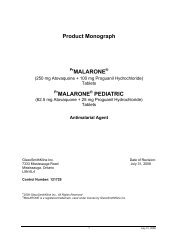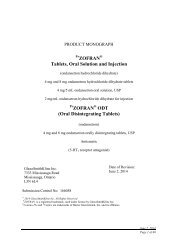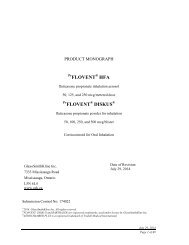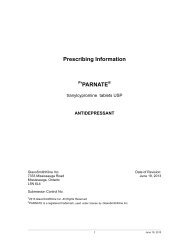ADVAIR DISKUS ADVAIR - GlaxoSmithKline
ADVAIR DISKUS ADVAIR - GlaxoSmithKline
ADVAIR DISKUS ADVAIR - GlaxoSmithKline
Create successful ePaper yourself
Turn your PDF publications into a flip-book with our unique Google optimized e-Paper software.
IMPORTANT: PLEASE READ<br />
WARNINGS AND PRECAUTIONS<br />
SERIOUS WARNINGS FOR ASTHMA PATIENTS<br />
TAKING <strong>ADVAIR</strong> ®<br />
Salmeterol, one of the active ingredients in <strong>ADVAIR</strong> ® ,<br />
increases the risk of asthma-related death. Salmeterol may<br />
increase the risk of asthma-related hospitalizations in patients<br />
4 to 18 years old. Therefore:<br />
• <strong>ADVAIR</strong> ® should only be used when a regular inhaled<br />
corticosteroid medicine along with a fast acting<br />
‘reliever’ medicine, such as salbutamol (e.g.,<br />
VENTOLIN ® ) are not adequately helping you with<br />
your breathing problems.<br />
• <strong>ADVAIR</strong> ® should not be the first asthma medication<br />
you use unless advised by your doctor.<br />
• Once asthma control has been achieved and<br />
maintained, your doctor will assess you at regular<br />
intervals. <strong>ADVAIR</strong> ® should only be used when an<br />
inhaled corticosteroid does not adequately control your<br />
asthma symptoms.<br />
For any concerns regarding the use of <strong>ADVAIR</strong> ® , consult<br />
with your doctor.<br />
<strong>ADVAIR</strong> ® is not for the treatment of acute asthma<br />
attacks. If you get a sudden attack of wheezing and<br />
breathlessness between your doses of <strong>ADVAIR</strong> ® , you should<br />
use your fast acting ‘reliever’ medicine, such as salbutamol<br />
(e.g. VENTOLIN ® ) which your doctor has prescribed to you.<br />
Use the medication as directed by your doctor.<br />
You may need to also take steroid tablets or syrup during a<br />
severe asthma attack, during other illnesses or during times of<br />
stress. Your doctor may give you some steroid tablets or<br />
syrup to carry with you as well as a steroid warning card,<br />
which will give you advice on when and how to use them.<br />
Before and while you use <strong>ADVAIR</strong> ® talk to your doctor or<br />
pharmacist if the following situations apply to you so that they<br />
can determine whether you should start or continue taking this<br />
medication:<br />
• Are suffering from any chest infection (cold, bronchitis).<br />
• Have ever had to stop taking another medication for your<br />
breathing problems because you were allergic to it or it<br />
caused problems.<br />
• Ever had a yeast infection (thrush) in your mouth.<br />
• Are having treatment for a thyroid condition.<br />
• Have diabetes.<br />
• Have high blood pressure.<br />
• Have heart problems.<br />
• Have had tuberculosis (TB) infections.<br />
• Are taking other “steroids” by mouth or by inhalation.<br />
• Are pregnant, planning to become pregnant or<br />
breastfeeding.<br />
• Are taking a medicine called ketoconazole, used to treat<br />
fungal infection.<br />
• Are taking medicines used to treat HIV infection (e.g.<br />
ritonavir, atazanavir, indinavir, nelfinavir, or saquinavir).<br />
• Have liver problems or cirrhosis.<br />
You should avoid coming into contact with anyone who has<br />
measles or the chicken pox while taking inhaled<br />
corticosteroids. If you or your child are exposed, tell your<br />
doctor right away.<br />
Asthma:<br />
After you start taking <strong>ADVAIR</strong> ® , your doctor may change the<br />
dosages of your other asthma medicines. Rarely, this may<br />
make a patient feel worse rather than better. This especially<br />
applies to oral corticosteroids (sometimes referred to as<br />
steroids), including prednisone. If your doctor decreases your<br />
oral steroid dose, and you become unwell, tell your doctor<br />
immediately.<br />
You should have your asthma assessed at regular intervals as<br />
agreed upon with your doctor. Once control of your asthma is<br />
achieved and maintained, your doctor may further adjust your<br />
dose of <strong>ADVAIR</strong> ® . Do not stop or change the dose of your<br />
<strong>ADVAIR</strong> ® unless your doctor has advised you to do so.<br />
If you notice the following warning signs, you should<br />
contact your doctor as soon as possible or go to the nearest<br />
hospital:<br />
• A sudden worsening of your shortness of breath and<br />
wheezing shortly after using your fast acting ‘reliever’<br />
medicine or after using <strong>ADVAIR</strong> ® .<br />
• You do not feel relief within 10 minutes after using<br />
your fast acting ‘reliever’ medicine or the relief does<br />
not last for at least 3 hours.<br />
• Measurement from your peak flow meter indicates a<br />
value less than 60 percent of predicted or personal best.<br />
• You are breathless at rest.<br />
• Your pulse is more than 120 beats per minute.<br />
The following warning signs indicate that your asthma<br />
condition may be worsening and that your treatment needs to<br />
be reassessed by your doctor.<br />
• A change in your symptoms such as more coughing,<br />
attacks of wheezing, chest tightness, or an unusual increase<br />
in the severity of the breathlessness.<br />
• You wake up at night with chest tightness, wheezing or<br />
shortness of breath.<br />
• You use increasing amounts of your fast acting ‘reliever’<br />
medicine.<br />
• Measurement from your peak flow meter indicates a value<br />
between 60 and 80 percent of predicted or personal best.<br />
July 29, 2014<br />
Page 62 of 67
















